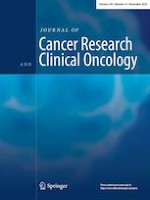Published in:

15-07-2023 | Bevacizumab | Research
Outcome benefits of bevacizumab biosimilar (SIBP04) combined with carboplatin and paclitaxel in advanced non-squamous non-small-cell lung cancer patients with EGFR mutation: subgroup analysis of a prospective, randomized phase III clinical trial
Authors:
Aidong Qu, Shiying Zhang, Hongxia Zou, Sixiu Li, Dandan Chen, Yaowen Zhang, Songsong Li, Huijun Zhang, Ji Yang, Yunkai Yang, Yubao Huang, Xiuling Li, Yuntao Zhang
Published in:
Journal of Cancer Research and Clinical Oncology
|
Issue 14/2023
Login to get access
Abstract
Purpose
SIBP04 is a bevacizumab biosimilar, and bevacizumab combined with carboplatin and paclitaxel in advanced non-squamous non-small-cell lung cancer (nsqNSCLC) has been recommended as the first-line treatment choice. However, the efforts of bevacizumab combined with carboplatin and paclitaxel for nsqNSCLC patients with EGFR mutation remained unclear. Here we report an EGFR mutation subgroup analysis of a prospective, randomized phase III clinical trial (NCT05318443).
Methods
In this randomized, double-blind, multi-center, parallel controlled, phase III clinical trial, locally advanced, metastatic NSCLC patients were enrolled, and EGFR expression was examined and considered as a stratification factor. All patients received 4 to 6 cycles of paclitaxel and carboplatin plus SIBP04 or bevacizumab 15 mg/kg intravenously followed by SIBP04 15 mg/kg maintenance until intolerable toxicity, disease progression or death. Patients with EGFR mutation and wild-type were assessed for progression-free survival (PFS) and overall survival (OS).
Results
EGFR expression was examined in 398 NSCLC patients (142 with EGFR mutation, 256 with EGFR wild type). PFS in EGFR mutation patients was significantly longer than EGFR wild-type patients (10.91 vs. 7.82 months; HR = 0.692, 95% CI 0.519–0.921, P = 0.011). The median OS in patients with EGFR mutation was not reached while that of EGFR wild-type group was 17.54 months (HR = 0.398, 95% CI 0.275–0.575, P < 0.001). However, there were no significant differences in objective response rate (61.97% vs. 55.86%, P = 0.237) or disease control rate (90.14% vs. 89.84%, P = 0.925).
Conclusion
Bevacizumab combined with chemotherapy significantly prolonged the PFS and OS of advanced nsqNSCLC patients with EGFR mutation.





